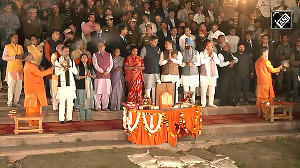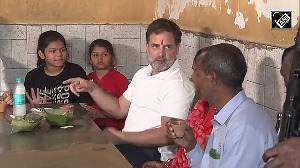
With just three days to go before the historic Pravasi Bharatiya Diwas gets underway, Amit Mitra, economist and secretary-general of the Federation of Indian Chambers of Commerce and Industries, is a busy man.
Mitra is a key figure in hosting the first-ever conference of non-resident Indians. The three-day event is being sponsored by the ministry of external affairs in partnership with FICCI.
Himself a non-resident Indian for 12 years, Mitra, a PhD from the Duke University in USA, returned to India in 1990 and joined FICCI in 1995. Today, the institution hires 185 economists and tries to influence government policy. An articulate spokesman for the Indian industry, he spoke to Senior Editor Sheela Bhatt about the conference, which will feature close to 1,500 NRIs from 59 countries. Excerpts:
What's the business agenda of the three-day conference and FICCI's role in it?
FICCI has 69 Joint Business Councils in 69 countries around the world. What is most interesting now is that the government's Joint Trade Commissions in each country are now simultaneously done [in collaboration] with FICCI's Joint Business Councils. Half the time it is signed in FICCI's own building. FICCI's reach all over the world is very large.
About four years ago, FICCI began to sense that Indians living in developed countries like the United States and the United Kingdom were undergoing a tectonic shift. From being worker immigrants of the 1960s to professional green-card holders, they were now becoming CEOs of the largest corporations in the USA. Almost 40 per cent of the Silicon Valley is owned by Indians.
Four years back, we felt the time was right to bring people of Indian origin -- not only in developed countries but even from countries where the Indian Diaspora is settled for the past 150 years -- into the vortex of the Indian economy, science, technology, research and Indian human capital in a synergic manner, where a win-win opportunity exists for India and those nations.
For five years we were pressing for Dual Citizenship, only keeping in mind the economic perspective. We made a huge presentation of 100 pages before the High Level Committee on Indian Diaspora to advocate Dual Citizenship. I had the opportunity of being a friend of the Black economist Thomas Sowell in the United States. He has written a classic book Migration and Cultures on international migration. He has a special chapter on the Indian Diaspora with more than 200 footnotes.
Here [in this opportunity] we could see the whole Diaspora in one place. Four years back, the first Conference of People of Indian Origin was held in Singapore, the next one was held in Delhi but it was a smaller affair where around 300 people from 22 countries had come. Somehow the international Diaspora could not convene a single conference elsewhere and in the meantime the committee's recommendations on the issue of NRI investments and the government's intention to work with the business community came through. This is the history behind the Pravasi Bharatiya Diwas.
What will be FICCI's main focus in the event?
Today out of the $70 billion foreign exchange reserves, perhaps in our estimate, $12 to $15 billion comes from remittances sent by overseas Indians. These are FICCI's estimates; real figures are not known. We believe that remittances translate into massive demand in the Indian market. For example, you get money from the Gulf, and you build a house, this way you stimulate the demand for cement and steel. You keep the money as savings in a bank and the bank will have liquidity and will lend it to Indian businesses.
So, the approach that remittances are nothing much and are a debt to India is wrong, FICCI doesn't believe in it. We believe it's a great stimulating debt that is being productively used with a multiplier effect. We must make remittance more stable and increase these remittances.
Two, converting remittances into investments is the challenge of this conference. Why only remittances? Let us make it into equity. Let it come into the large machinery [sector] and business ventures. The technological knowledge of the PIO [People of Indian Origin] is at the cutting edge. Indians are doing fundamental technological research all over the world but we have no synergy with them. Whether it's biotechnology or bio-medical engineering or any such field you'll find Indians leading the process.
In Connecticut, in the Pfizer laboratory -- I saw out of 300, 58 professionals with PhDs were Indians. They are doing frontline research in pharmaceuticals. But we have no connectivity with them. Through this conference we would like to see how we can exchange and transfer technology with them. In the area of genomics, fundamental research is done in India and as well as abroad but our connectivity is very weak. Human resource flow to India requires attention.
5000 students come from ASEAN [Association of South East Asian Nations] countries to study in our universities. We should have 50,000 students but there is no channel, no knowledge and no ratings for Indian universities. When children of overseas Indians come to India to study, a whole cultural regeneration happens. They understand India as insiders, not as outsiders.
Another aspect we will be looking into in this conference is the issue of joint ventures. We have not come forward for joint ventures, both ways. Neither are we going abroad, nor are they coming here. The Pravasi Bharatiya Diwas will be the meeting point. The point of confluence between Indian entrepreneurs to meet their counterparts from abroad. After all, the world's largest Palm oil refinery is in Malaysia, owned by the Birla Group. Laxmi Mittal has the world's largest steel company. But where is the opportunity to have some confluence? This is a sangam between the strengths of PIO and strengths of India.
But the Indian ground realities are not matching with your positivism. China remains a better example.
These are preliminary steps towards the historical process of change. As far as China is concerned the whole history of their migration is totally different. 74 per cent of the people in Singapore are Chinese. Over 30 per cent people in Malaysia are Chinese, and in Indonesia over 20 per cent. They control the economy of Malaysia and Indonesia. Of course, Hong Kong is now part of China and, in the Philippines the Chinese groups are at the top.
The Chinese went to these countries more than 200 years ago but since the last 100 years they are entrepreneurs. Indians went to many countries as indentured labourers. Those who have money and entrepreneurial skill went as professionals in the mid-sixties. The context is entirely different.
Let us understand history to understand the magnitude of this relationship. I am not saying that at the end of the conference we will get $10 billion from overseas Indians. What we will get will be just a trickle but the interest will be generated, and in five to ten years you'll see massive investment in technology and human capital. Money will come from abroad.
Since there is no patriotism involved in such investment the bottom-line will be the profit margin. Right?
Yes. There is no patriotism involved and we don't want any patriotism because no business anywhere in the world is done on the basis of patriotism. It will depend on hard-nosed returns. What we are telling overseas Indians is that if General Electric has put down $1.2 billion in assets in India, why can't they? It came here with one company and today they have 21 companies. It's building the Centre of Excellence outside the US in Bangalore to hire 1000 people with PhDs.
There must be a reason for its returns.
GE is not doing charity. In the same way Motorola and AT&T, the Japanese and Koreans are doing business here. Today after all, on our roads you see most cars are manufactured by foreign companies. I drive a Honda City, not an Ambassador. Why are they here? Because they are making big bucks.
FICCI's recent study shows that 54 per cent of the 450 foreign direct investors in India are making significant profits in India. The same survey in China shows that only 15 per cent are making profits. In our survey 68 per cent of foreigners are looking for an expansion in India. That means they expect profits. Already all multinationals are in India and they have smelt big profits.
How are you going to channelise NRI interests in India?
FICCI's president A C Muthiah will announce that FICCI will form a special core group only for NRIs which will then start synergising with the Commission. We are hoping that out of this conference, the government will form a Commission that will look after the needs of the PIO. Our core group will have an expertise, database. We will provide professional services. FICCI International Forum is going to be set up in every major country of the world and we are sure that a big proportion of these forums will be overseas Indians.
Which are the sectors where NRI investment can become lucrative?
NRIs should invest in knowledge driven industry. Apart from the Mittals and few other exceptions NRIs have not built massive manufacturing units. They have built knowledge driven profit centres. Chemicals, pharmaceuticals, biotechnology, entertainment, animation, software, hardware technology, health equipment are few sectors where NRIs can invest.
What about other problems?
We are addressing them every day. But all these things happen simultaneously. While the Diaspora process goes on, we fight on the ground to change the realities of India.
How different is this conference for FICCI which organises more than 300 conference a year?
There has never been a conference of this size and this complexity. Each person coming has a different intent. Each one is a big daddy in his own country and all of them want to speak. They want to articulate their great achievements. To accommodate their wishes and nostalgia is a different challenge.
I think the hype attached to this conference is justified. The gross domestic product of overseas Indians is more than the entire GDP of India. I think the hype is too small for its relevance.
I think our human capital that is living abroad is still not integrated with the Indians process of change. IT experts in UK do not know what to do with India? A conference like this will give a sense of what you can do. Even in your villages if you want to do social development, FICCI will help you now. We will help build schools and such institutions, too.
In a normal conference there are no emotions, only business-talk is conducted. This is a conference which not only has a body but it has a heart and has a soul.
ALSO READ:






 © 2025
© 2025